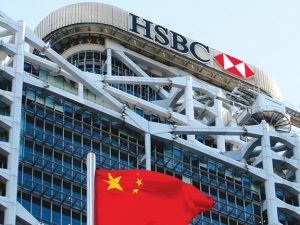Bloomberg
HSBC Holdings Plc and Standard Chartered Plc maintained their best lending rates Thursday even as the city’s monetary authority raised its base rate to keep pace with the Federal Reserve, a move that will likely stave off some pressure on homeowners and businesses for now.
Hours after the Hong Kong Monetary Authority (HKMA) said it would raise its rate 75 basis points to 2.75%, HSBC said in a statement it would not change its best lending rate, which is currently at 5%. Standard Chartered said it will keep its best lending rate at 5.25%. Both banks kept their Hong Kong dollar savings rate unchanged but raised their US
dollar savings rates.
The city’s de-facto central bank had to raise its benchmark interest rate, as the authority moves in lockstep with the hawkish Fed given the Hong Kong dollar’s peg to the greenback.
But that leaves the city in a tough spot: The US is raising rates to combat historically high inflation, but Hong Kong is contending with higher rates while the economy struggles after a Covid-fuelled slump and knock-on effects from China’s own
Omicron outbreak. Economic growth turned negative in the first quarter, and the city reports April-to-June figures next week.
“Continuous rate hikes are disadvantageous for economic recovery,†Financial Secretary Paul Chan told reporters at a press briefing on Thursday. Citing deteriorating “global economic prospects,†along with Russia’s invasion of Ukraine earlier this year, he said the city would “closely monitor the external economic environment.â€
Economists expect the Hong Kong banks will eventually have to lift their rates this year, some by as much as 100 basis points. That would be the first time in four years that Hong Kong banks have done so — and such a rise would increase borrowing costs for companies and individuals at a time when Hong Kong’s Covid-19 restrictions continue to weigh on economy and hurt employment.
“This move by HSBC to stand still does not surprise me as there remains ample liquidity in domestic banking system such that they do not need to adjust rate to attract Hong Kong dollars, and the current spread between the HKMA base rate and prime rate has not fallen under 200 basis points,†said Moody’s Analytics economist Heron Lim.
If banks choose to increase their best lending rates, “the other side of the equation†is that they would also have to increase their Hong Kong dollar savings rate, said Bloomberg Intelligence senior analyst Francis Chan. Without a further increase to interbank rates, “it may not be necessarily wise for them to raise†prime rates
currently, he said.
An exodus of residents amid political tensions and one of the world’s most restrictive quarantine policies are also putting pressure on Hong Kong’s real estate market.
The Fed’s aggressive path this year, along with the HKMA’s need to follow, have also fuelled debate about the effectiveness of the linked exchange rate system. The city’s monetary authority has ramped up currency purchases this year to maintain the peg as ample liquidity made it attractive for traders to short the local dollar against the higher-yielding greenback.
HKMA Chief Executive Eddie Yue called out “irresponsible†comments about the mechanism in a statement last week, while Chan said Hong Kong’s foreign exchange reserves can support the system even amid capital outflows.
“The clear fact is that Hong Kong’s monetary and financial markets have continued to remain stable and operate in an orderly manner,†Yue said at a press briefing on Thursday, adding that the “the linked exchange rate system remains robust over the years having weathered different interest rate cycles.â€
 The Gulf Time Newspaper One of the finest business newspapers in the UAE brought to you by our professional writers and editors.
The Gulf Time Newspaper One of the finest business newspapers in the UAE brought to you by our professional writers and editors.
